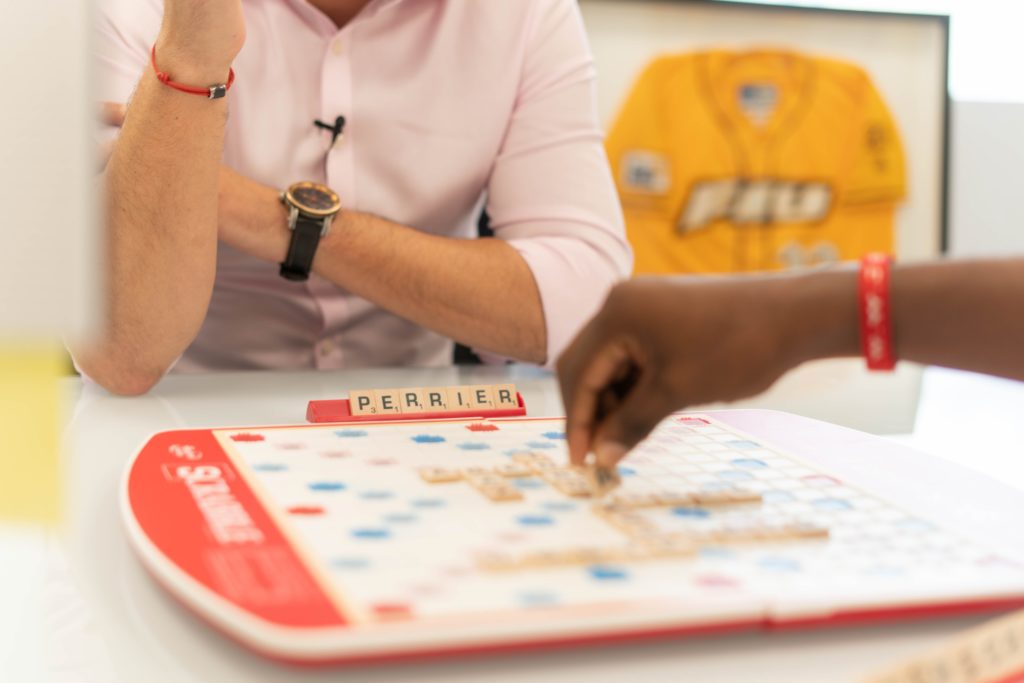2 Comments
by Team REF
January 25, 2021


There are many aspects to learning a new language, and one of them is memorizing vocabulary. It’s helpful to familiarize yourself with its grammar or maybe the script if the writing is not done in a script that you are used to. The most basic and, at the same time, crucial part of learning a new language is vocabulary. The more words you know, the easier it will be for you to use the language.
Learning and memorizing vocabulary takes time and a lot of repetition. You might picture yourself with long lists of words that you need to cram into your head. Memorizing vocabulary can actually be a fun activity! There are many ways that can help you improve your vocabulary. We’ll give you some tips below on how this can be done in a fun way so that you are able to speak the new language quickly and with confidence.
How Your Memory Works
According to Harvard University, our memory can be divided in two systems. System one involves fast, unconscious routine processes, and system two deals with slower, conscious processes that require more effort. These two systems interact together in what is deemed as a dual-process of the memory. Within these two systems, there are three processes at work: encoding, storage, and retrieval. Encoding refers to the way we take in information. Storage deals with how the information is stored in our memory. Retrieval is how we get the information from our memory.
Here, we see a distinction between short and long-term memory. Information stored as short-term memory can easily be forgotten if not repeated often. In general, we can only store up to nine pieces of information in our short-term memory. Our long-term memory, however, can store almost an unlimited amount of information for a limitless amount of time.
Training the Brain for Memorizing Vocabulary
Our memory is part of our brain, which is a muscle. This means that we can train and improve our brain just like other muscles in our bodies. Here are some tips on how you can improve your memory and brain activity.
Exercise
When you exercise, the blood flow to your brain increases. Exercising helps make new nerve cells and develop connections between brain cells. It also protects the brain against degeneration. So, to improve your memory, get your body moving!
Sufficient Rest
Your body, including your brain, needs to rest after a long day of working or studying. While sleeping, your brain creates and stores memories. It’s ideal to get between 7-9 hours of sleep a night because anything less can result in your brain deteriorating.
Eat Healthy
Healthy food positively impacts your body and mind. Be sure to include fruits, vegetables, fish, nuts, and unsaturated oils into your diet. If you eat these foods, you are less likely to develop dementia. Eating healthy also means reducing your sugar intake because sugary foods can lead to memory loss. Drinking a lot of sugary beverages could actually lead to Alzheimer’s disease. Also, make note of the calories you consume because meals high in calories can lead to obesity and memory loss as a result of brain inflammation.
Moreover, avoid tobacco and drink no more than two alcoholic drinks a day. Coffee and green tea are recommended because caffeine is helpful for both short and long-term memory. And, for the chocolate lovers, dark chocolate actually improves your memory and brain functions. As mentioned before, too much sugar can be damaging, so make sure you do not eat chocolate with added sugars. Chocolate containing at least 72% cacao is healthier than white chocolate.
Socialize
Having friends around you is fun and comes with many health benefits. Strong social ties reduce the risk of dementia by lowering your blood pressure and can even result in a longer life expectancy. A social network will help you stay healthy mentally and physically. Without friends and socialization, feelings of loneliness can lead to high blood pressure and depression.
Play Games
Continue stimulating your brain by solving puzzles, playing board games, or drawing and painting. Keeping your brain active ensures that new connections between nerve cells are built. Moreover, new brain cells can be formed through these activities, which may serve as a reserve against brain loss.

Effective Strategies for Memorizing Vocabulary
Now that we have looked at the brain as a whole and ways to improve our memory, let’s focus specifically on learning new vocabulary. As mentioned before, during the process of storage, we have short-term and long-term memory. When learning a word for the first time, it is stored in our short-term memory. The key to learning vocabulary is to transfer the words from short-term memory to long-term memory so that we don’t forget them.
What are some ways to do this and make it fun at the same time?
Mnemonics
A mnemonic is a tool that helps you remember information. In our case, we’ll apply it to remembering vocabulary. When learning new vocabulary, mnemonics create connections between the word itself and something that can be triggered so that you recall the word in the future. For example, when you see a new word for the first time, an association with the word can automatically pop into your brain. It might remind you of a word in your first language or bring up an image in your brain. These associations with another word or image, can be used as mnemonics to recall the new term the next time you need it.
With mnemonics, learning vocabulary is done by relating words to other information that is already stored in your brain by using your own imagination.
Rote Learning
With rote learning, you keep on repeating words until you have memorized them. This method is often used in schools to learn the alphabet or number facts. At times, rote learning is considered boring because it is overly repetitive. Because of this, many prefer to choose other learning techniques. Rote learning, however, comes in handy when learning the basics of a language quickly. You can use it to get the foundational understanding of a language, then build on that by using other vocabulary learning techniques. One way to break from the monotony of rote learning is by interchanging it with other strategies.
While using the rote learning technique, ask someone to hold flashcards with the words in one language while you translate them into the other language. Turn it into a race and see who can translate the terms the fastest. To really test your skills, be sure to translate in the other direction, too.
Visualize
One way to make words stick is by learning with visuals. As human beings, we think in images. When people tell stories, we make mental pictures and scenes about what we’re being told rather than read sentences on a page.
When learning vocabulary, you can make use of this by drawing simple pictures that represent the new terms. First, read the words a couple of times while looking at the pictures. Then, cover the words and try to remember the words based solely on the pictures.
Songs
When you have a long list of vocabulary terms you need to learn, sing about it! Putting a melody to the words is a highly effective way to help you remember information better. It kind of works the same as a mnemonic. To start, connect new words to melodies you already know. Another way to improve your vocabulary in the new language you’re studying is by listening to songs in that language. You might have to look up the lyrics the first time you hear the song to find out the meaning of words you might not know.
The more you listen to songs, the more you will improve your vocabulary knowledge. This is because most songs are repetitive, and repetition is key to memorizing vocabulary. Whether it is done through rote learning, looking at pictures multiple times, or associating a melody with words, memorizing vocabulary in English or another language is possible.
Watch and Read
Watching the news or movies spoken in a target language can substantially increase your comprehension. When doing so, you become familiar with the words being used in context. You might want to use subtitles at first, but we recommend watching without them as you become more familiar with the dialogue. The more you watch, even if it’s the same movie, the better your understanding will become.
The same goes for reading. Whether it is a local newspaper or a novel, your vocabulary improves the more you read. If you don’t understand a certain word, try to find its meaning from the text itself. If it becomes too difficult to figure out, then feel free to grab a dictionary to look it up.
The Protégé Effect
The protégé effect simply means that you learn by teaching others. Once you have studied your new vocabulary terms, tell others about what you just learned. Putting it into practice makes you remember it better. You can also start using the new vocabulary in sentences while speaking to fellow students or native speakers. Don’t be afraid to make mistakes. We learn by making mistakes! The more you make use of the newly acquired vocabulary, the faster it will become part of your own lexicon and long-term memory storage bank.

Takeaway
Memorizing vocabulary is part of the process when learning a new language. There are several processes at work in our brains from encoding to storage to retrieval. The brain, being a muscle, can be trained just like any other muscle in our bodies. Some general tips that you can apply to improve your memory involve exercising, eating healthy, sleeping, socializing, and playing games. In between learning new vocabulary, make sure you practice these activities to optimize your brain function.
As for memorizing vocabulary terms themselves, there are a plethora of ways to do this. Choose which ones work for you, be consistent, and have fun while learning a new language! It might be a long process and require discipline, but it’ll be worth it the moment you start seeing your growth in your new language. All the hard work will be worth it.
-
Pingback: Improve Your English Writing Skills | Writing Tips |Rapid English Fluency
-
Pingback: Learn English on Your Own with These Resources - Rapid English Fluency
Don't miss any posts!
Sign up for our Newsletter and receive special offers, English teaching tips, activities for individual and group study, and much more!
